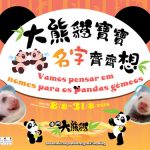 Government invites residents to name first Macao-born giant panda cubs
Government invites residents to name first Macao-born giant panda cubs
The Government is to invite all residents to suggest respective Chinese names for the first giant panda cubs to be born in Macao. The period for submission of name suggestions is from 8 to 31 August inclusive. All Macao identity card holders (permanent and non-permanent) are welcome to suggest one name for each of the twin male cubs. The criteria by which name suggestions would be judged would be: the actual meaning of the proposed names; the creative thinking put into the choice of suggested names; the sound of the names in spoken Chinese; the naming practices applied to those giant pandas given by China to foreign countries; and the names previously applied to giant pandas worldwide. Representatives of the Civic and Municipal Affairs Bureau and representatives from the Chengdu Research Base of Giant Panda Breeding will choose from all the submissions a pair of names. Every identity card holder is allowed to submit a pair of names (i.e., one name for each giant panda cub). Residents will be able to do so – and should offer a brief description of the suggested names – via the website dedicated to Macao’s giant pandas, at: http://www.macaupanda.org.mo. Written suggestions can be handed in via the service centres of the Civic and Municipal Affairs Bureau. Female giant panda “Xin Xin” gave birth to the twins on 26 June at the Macao Giant Panda Pavilion. At birth the panda cubs were nicknamed respectively “Dabao” and “Xiaobao”. “Xin Xin” and the father of the cubs – a male giant panda named “Kai Kai” – are housed at the Macao Giant Panda Pavilion. A pair of giant pandas was given by the Central Government to Macao in 2015 as a gift for the 15th anniversary of the establishment of the Macao Special Administrative Region.
View gallery


